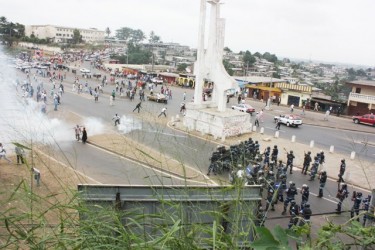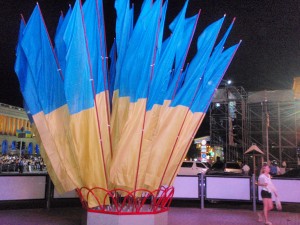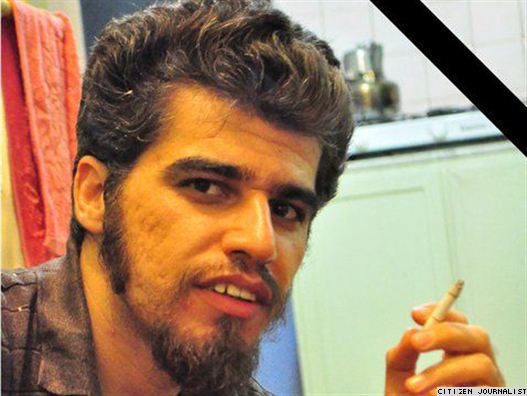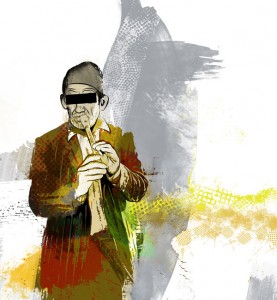Twenty years since Ukraine’s independence, a generation has grown up for whom the USSR, with its oppression of any dissent and a system of total fear, is nothing but a history textbook term. However, a recent wave of political repressions that began in Ukraine in 2010 has sparked widespread comparisons with the country’s totalitarian past.
Arrests of government officials who served under former Prime Minister and current opposition leader Yulia Tymoshenko began less than a year into the presidency of Viktor Yanukovych. Among those accused of corruption [ENG] are ten of her senior aides, a former Interior Minister and an opposition party leader Yuriy Lutsenko. Tymoshenko herself has been recently denied a trip to Brussels [ENG], due to an ongoing criminal investigation.
In addition to ex-government officials and opposition leaders, the list of professions that have recently become dangerous in Ukraine includes civic activists, entrepreneurs, journalists, bloggers, and even writers. This trend has prompted some analysts to speak of a systematic crackdown on dissent [ENG] rather than a widespread campaign against corruption launched [ENG] by the current President.
While the mainstream media have been providing consistent coverage of the cases against former senior state officials and the opposition, reports of numerous arrests and pressure on the not-so-prominent figures have been sporadic. In fact, most chronologies of political repressions against “ordinary people” have been attempted by bloggers, independent journalists, and cyber-activists.
Among the first ones to make such an attempt is Diana Makarova (LJ user diana-ledi), a journalist-turned-blogger. On Jan. 21, 2011, she put together the available information and came up with more than 40 names of those who have been detained or pressured since December 2010. Among them are participants of the 2010 entrepreneurs’ Tax Protests [ENG], accused of damaging state property, 15 activists of the nationalist organization “Tryzub” (charged with blowing up an illegally-installed monument to Joseph Stalin), activists of political party “Svoboda” (same charges), Ukrainian writer Maria Matios, poet and magazine editor Marina Bratsylo and her husband Yuriy Noga (charges unclear), blogger Olena Bilozerska (see this GV post), head of a regional branch of political party “People’s Self-Defense” (charges unclear), and a Zaporizhzhya history student not connected to any political organization, Eduard Andryushchenko (LJ user did-panas23), who had been gathering information about Ukrainian nationalist movements for his thesis.
Below are a few translated excerpts from the chronology posted on Makarova’s blog [RUS]:
On Dec. 10, 2010, ARRESTS OF ENTREPRENEURS involved in the organization of the [Tax Protests] HAVE BEGUN. Charges include damaging marble tiles where the tent city had been set up. In Kyiv, a participant of the entrepreneurs’ [protests] Sergei Kostakov has been detained. Sentenced to two months. The court hearing took place with no lawyer present.
[…]
Jan. 10, 2011. Some 15 leaders of “Tryzub” have been detained. […] There’s no way to communicate with those arrested, it is not known where they’re being kept, their relatives and lawyers are being prevented from visiting, nothing can be passed to the detainees.
[…]
Around the same time […] Eduard Andryushchenko, who is not officially connected to either “Svoboda” or “Tryzub”, was arrested. After three days of interrogations, the [young man] was released. But the police were waiting for him at the exit. After this second arrest Eduard Andryushchenko disappeared. The police kept his location secret for about a week.
[…]
Jan. 13, 2011. Four members of organization “Tryzub” (Philip Taran, Roman Khmara, Sergei Borisenko, Rostislav Vinar) are being transferred from [Ivano-Frankivsk] to [Zaporizhzhya] (supposedly for an investigation-related experiment). Vasily Labaichuk is already there. After that their destiny remained unknown despite searches at the [State Security Service], detention areas, etc. Relatives and a lawyer were prevented from visiting the arrested.
[…]
Jan. 17, 2011. Roman Khmara has been found. He is being kept in Leninskiy District Police Department. He’s been beaten up by representatives of Rohatynskyi District Police Department, since the day of the arrest the lawyer hasn’t been allowed to visit him, he is in need of medical treatment.
[…]
Jan. 20, 2011. [Chernovtsy]. Brutal detention of an entrepreneur Lidiya Gaina, one of the participants of the [Tax Protests]. She was called to appear before police as a witness, and was then taken to court, without any explanation. As a result of such detainment, the woman had an asthma attack and heart problems. […]
Other bloggers who tried to spread information included Kyiv-based LJ user ax-attilla, who listed [UKR] the arrested activists of nationalist organizations, Yevgeniy Novitskyi from Simferopol (LJ user novitsky), Kyiv-based LJ user klodius, Dnipropetrovsk blogger Andriy Denysenko (LJ user andr-denysenko), LJ userooany-wonderoo, Kyiv activist Andriy Khartanovych (LJ user endryx), Kyiv-based blogger and journalist Olena Bilozerska (LJ user bilozerska), and others.
Members of Maidan.org.ua, a popular Internet hub of citizen activism, have created a wiki-based collection [UKR] of materials on recent political repressions in Ukraine.
One of the website’s activists, Natlaka Zubar (LJ user pani-maidan), wrote this [UKR]:
15 people arrested for political activity and dozens under investigation, and that’s only in one month – is that enough to speak of the beginning of political repressions? I’m sure if [we] don’t scream about it from every corner, the number would grow too fast for the society to be able to realize the scope of the repressions. […]




